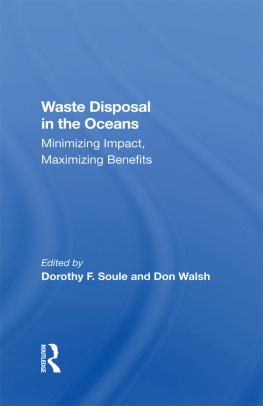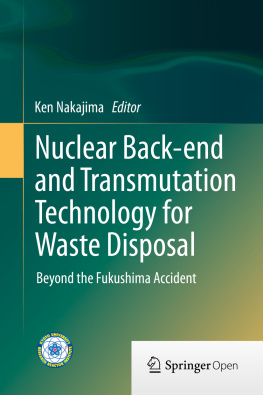Waste Disposal in the Oceans
Westview Replica Editions
The concept of Westview Replica Editions is a response to the continuing crisis in academic and informational publishing. Library budgets for books have been severely curtailed. Ever larger portions of general library budgets are being diverted from the purchase of books and used for data banks, computers, micromedia, and other methods of information retrieval. Interlibrary loan structures further reduce the edition sizes required to satisfy the needs of the scholarly community. Economic pressures on the university presses and the few private scholarly publishing companies have severely limited the capacity of the industry to properly serve the academic and research communities. As a result, many manuscripts dealing with important subjects, often representing the highest level of scholarship, are no longer economically viable publishing projects--or, if accepted for publication, are typically subject to lead times ranging from one to three years.
Westview Replica Editions are our practical solution to the problem. We accept a manuscript in camera-ready form, typed according to our specifications, and move it immediately into the production process. As always, the selection criteria include the importance of the subject, the work's contribution to scholarship, and its insight, originality of thought, and excellence of exposition. The responsibility for editing and proofreading lies with the author or sponsoring institution. We prepare chapter headings and display pages, file for copyright, and obtain Library of Congress Cataloging in Publication Data. A detailed manual contains simple instructions for preparing the final typescript, and our editorial staff is always available to answer questions.
The end result is a book printed on acid-free paper and bound in sturdy library-quality soft covers. We manufacture these books ourselves using equipment that does not require a lengthy makeready process and that allows us to publish first editions of 300 to 600 copies and to reprint even smaller quantities as needed. Thus, we can produce Replica Editions quickly and can keep even very specialized books in print as long as there is a demand for them.
About the Book and Editors
Waste Disposal in the Oceans: Minimizing Impact, Maximizing Benefits edited by Dorothy F. Soule and Don Walsh
After a decade of attempts to control pollution with broad, sweeping legislation on a national scale, recent efforts have recognized the need to evaluate waste disposal on a case-by-case or regional basis, incorporating new knowledge about the consequences of disposal. This book examines the major uses and effects of waste disposal in the ocean, paying particular attention to California's coastal waters. The contributors, representing public agencies, academe, and research institutions, take into account environmental concerns while they focus on developing management strategies of using the oceans for waste disposal. The book is a result of the 1982 symposium "Ocean Disposal in the 1980s," which was sponsored by the Southern California Academy of Sciences .
Dr. Dorothy F. Soule is director of Harbors Research Laboratory, senior research scientist at the Institute for Marine and Coastal Studies, and adjunct professor of environmental engineering at the University of Southern California, where Dr. Don Walsh is director of the Institute and professor of ocean engineering.
Published in cooperation with the Institute for Marine and Coastal Studies, University of Southern California
Waste Disposal in the Oceans
Minimizing Impact, Maximizing Benefits
edited by Dorothy F. Soule and Don Walsh
First published 1983 by Westview Press, Inc.
Published 2019 by Routledge
52 Vanderbilt Avenue, New York, NY 10017
2 Park Square, Milton Park, Abingdon, Oxon OX14 4RN
Routledge is an imprint of the Taylor & Francis Group, an informa business
Copyright 1983 Taylor & Francis
All rights reserved. No part of this book may be reprinted or reproduced or utilised in any form or by any electronic, mechanical, or other means, now known or hereafter invented, including photocopying and recording, or in any information storage or retrieval system, without permission in writing from the publishers.
Notice:
Product or corporate names may be trademarks or registered trademarks, and are used only for identification and explanation without intent to infringe.
Library of Congress Cataloging in Publication Data
Main entry under title:
Waste disposal in the oceans.
(A Westview replica edition)
1. Waste disposal in the ocean--United States. 2. Waste disposal in
the ocean--Environmental aspects--United States. I. Soule, Dorothy F.
II. Walsh, Don, 1931
TD763.W347 1983 628.3'9 83-10575
ISBN 13: 978-0-367-21316-9 (hbk)
Contents
Don Walsh
George Peter and Thomas O'Connor
Thomas L. Hart
Fred M. Piltz
Kenneth J. Lanfear and William B. Samuels
R. E. Pieper and J. A. Dmohowski
Gary S. Kleppel, William B. Samuels, and John J. McLaughlin
Dorothy F. Soule, Mikihiko Oguiri, and John D. Soule
Lisa M. Anderson, James S. Kuwabara, and Wheeler J. North
Robin Sevareid and Gary Ichikawa
David A. Brown, Richard W. Gossett, Patrick Hershelman, Henry A. Schaefer, Kenneth D. Jenkins, and Edwin M. Perkins
John S. Stephens, Jr., Pamela A. Morris, and William Westphal
John H. Dorsey, Karen D. Green, and Richard C. Rowe
Donald J. Reish, Thomas Biksey, and Richard Ware
Kenneth R. Kvammen
Irwin Haydock
After a decade of massive effort to control pollution in land, water, and air media by means of sweeping environmental legislation, regulation enforcement, and the concomitant expenditure of billions of dollars, the 1980s have already seen a reexamination of the original premises and the methods selected to implement them. A number of realities have become apparent; that massive infusions of funds cannot automatically resolve all waste problems; that the medium-by-medium approach to waste disposal has at times led to a "no alternative" answer for management; that overgeneralization for the sake of legalistic "equality" may in fact have denied the inate biological, physical, chemical, and ecological differences in the very diverse environments of the United States; and that "solutions" have often been imposed without the proper basis of scientific research and information.
The historical view of the oceans as virtually limitless receptacles for societal wastes resulted in centuries of degradation of rivers and estuaries and ultimately of coastal inshore waters. Although in the United States pollution legislation dates back to the Rivers and Harbors Act of 1890 and the Federal Water Pollution Control Act (FWPCA) PL 80-845, of 1948, it was not until the signing of the National Environmental Policy Act of 1969 (PL 91-190) in January 1970 that important regulatory powers were implemented. The dominant purpose of the FWPCA and its subsequent major amendments in 19 72 (PL 92-500) and 1977 (PL-217) was to restore the biological integrity of the Nation's waters. The 1972 Marine Protection Research and Sanctuaries Act ("The Ocean Dumping Act," PL 92-532) and the 1978 National Ocean Pollution Research, Development and Monitoring Planning Act (PL 95-273) have also had significant regulatory impact on marine water quality and regulation.










